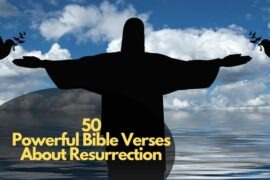Reincarnation has long fascinated the human mind, sparking philosophical debates and spiritual quests for answers about the cycle of life and death. As seekers of truth delve into this topic, it is only natural to inquire about its significance within religious texts.
In this article, we will embark on a journey through the pages of the Bible to unravel its teachings on reincarnation. By exploring biblical passages, interpreting theological perspectives, and examining the influence of reincarnation on faith and spirituality, we aim to shed light on what the Bible truly reveals about this enigmatic concept.
Whether you approach this subject with a curious mind or seek to deepen your understanding of biblical teachings, join us as we uncover the ancient wisdom that lies within the Bible’s perspective on reincarnation.
Contents
What Does The Bible Say About Reincarnation
The Bible teaches that each person has only one life on Earth, followed by judgment and either eternal life with God or separation from Him. In Hebrews 9:27, it states, “Just as people are destined to die once, and after that to face judgment.” This verse suggests that death is a one-time occurrence, after which individuals are held accountable for their actions in life.
Additionally, Jesus spoke about the afterlife and resurrection, emphasizing a singular event. In John 5:28-29, Jesus says, “Do not be amazed at this, for a time is coming when all who are in their graves will hear his voice and come out—those who have done what is good will rise to live, and those who have done what is evil will rise to be condemned.” This passage suggests a resurrection of all people at a specific time, rather than a continuous cycle of rebirth.
While there are instances in the Bible where individuals are brought back to life, such as Lazarus or Jesus Himself, these accounts should be understood as miracles rather than examples of reincarnation. They serve to demonstrate God’s power and the authority of Jesus over life and death.
Definition of reincarnation
Reincarnation refers to the belief or concept that an individual’s soul or consciousness is reborn into a new body after death. It suggests that the cycle of birth, death, and rebirth is a continuous process through which individuals experience multiple lifetimes. The specific circumstances of each reincarnation are often believed to be influenced by the actions and choices made in previous lives, leading to the notion of karma and the potential for spiritual growth and evolution.
Significance of exploring the biblical perspective on reincarnation
The Bible holds a significant place in the lives of millions, serving as a sacred text and a guide for moral and spiritual beliefs. Understanding its perspective on various topics, including reincarnation, is of great importance for those seeking a comprehensive understanding of religious teachings. Exploring the biblical perspective on reincarnation allows individuals to align their beliefs with scripture and engage in thoughtful discussions within religious communities. It also enables deeper insights into the theological implications and potential reconciliations between the concept of reincarnation and Christian doctrines.
Purpose of the article
The purpose of this article is to delve into the biblical perspective on reincarnation and shed light on what the Bible truly reveals about this intriguing concept. By examining key passages from both the Old and New Testaments, analyzing theological interpretations, and considering the broader implications of reincarnation within Christian theology, this article aims to provide readers with a comprehensive understanding of the Bible’s stance on reincarnation.
Furthermore, it seeks to encourage readers to engage in personal reflection, critical thinking, and further study to develop their own informed perspectives on this topic. Ultimately, this article aims to contribute to a well-rounded exploration of the relationship between reincarnation and biblical teachings, fostering a deeper understanding of faith and spirituality within the context of the Bible.
Reincarnation in the Old Testament
The exploration of the Old Testament’s perspective on reincarnation begins with a thorough examination of key passages that are often cited in discussions related to this topic. These passages may include references to individuals being “born again” or experiencing a form of rebirth. Examples of such passages include the encounter between Nicodemus and Jesus in John 3:3, where Jesus speaks of the need to be “born again,” and the prophetic words of Malachi 4:5-6, which mention the return of the prophet Elijah before the coming of the Lord.
Analysis of interpretations and debates surrounding these passages
The analysis of these key passages involves an exploration of the diverse interpretations and debates that have emerged throughout history regarding their implications on the concept of reincarnation. Various theological perspectives exist, ranging from those who argue for a literal interpretation of these passages as evidence of reincarnation to those who propose alternative symbolic or metaphorical meanings. By examining the arguments and counterarguments put forth by scholars, theologians, and religious commentators, a comprehensive understanding of the different viewpoints surrounding reincarnation in the Old Testament can be gained.
Understanding the historical and cultural context of the Old Testament’s view on reincarnation
To gain a deeper understanding of the Old Testament’s perspective on reincarnation, it is crucial to consider the historical and cultural context in which these texts were written. The ancient Israelites’ beliefs and worldview, influenced by their interactions with neighboring cultures, shaped their understanding of life, death, and the afterlife.
Exploring concepts such as ancestor veneration, the role of prophets, and the prevailing religious beliefs of the time can provide valuable insights into how ideas related to reincarnation may have been perceived and expressed within the Old Testament’s cultural milieu. Additionally, an understanding of the literary genres, symbolism, and metaphorical language employed in the Old Testament can aid in interpreting passages that touch upon reincarnation.
By engaging in a comprehensive examination of key passages, analyzing interpretations and debates, and considering the historical and cultural context, a clearer picture can emerge regarding the Old Testament’s view on reincarnation. This multifaceted approach allows for a more nuanced understanding of the biblical perspective on reincarnation and encourages a deeper appreciation for the intricate interplay between religious beliefs, cultural influences, and textual interpretation in ancient times.
Reincarnation in the New Testament
Turning our attention to the New Testament, we embark on an exploration of passages that are often discussed in relation to reincarnation. While the New Testament does not explicitly mention the term “reincarnation,” there are passages that contain elements or allusions that have been interpreted in connection with the concept. These passages may include references to the return of individuals or the notion of spiritual transformation. Examples could be found in Matthew 11:14, where Jesus speaks of John the Baptist as the reincarnation of the prophet Elijah, and in Matthew 16:13-14, where Jesus asks his disciples who people say he is, suggesting the possibility of previous incarnations.
Comparison of Old Testament and New Testament perspectives
Comparing the Old Testament and New Testament perspectives on reincarnation allows us to discern any differences or similarities in how the concept is presented within these biblical texts. While the Old Testament contains passages that are often associated with reincarnation, the New Testament provides a fresh perspective on spiritual renewal, salvation, and the afterlife through the teachings of Jesus Christ. Understanding the continuity or divergence between the two testaments aids in unraveling the evolving understanding of life, death, and the spiritual journey within the biblical narrative.
Examination of theological interpretations and debates
Theological interpretations and debates surrounding the passages relevant to reincarnation in the New Testament are diverse and varied. Scholars, theologians, and religious thinkers have presented different viewpoints on the intended meaning and implications of these passages.
Some argue for a literal interpretation of the passages, suggesting that they support the concept of reincarnation as a means of spiritual growth and redemption. Others propose metaphorical or symbolic interpretations that emphasize the themes of spiritual rebirth and transformation without explicitly endorsing reincarnation as commonly understood. By examining these interpretations and engaging in the debates, we gain insight into the theological considerations and differing perspectives on reincarnation within the New Testament.
Through the exploration of relevant New Testament passages, a comparison with the Old Testament perspectives, and an examination of theological interpretations and debates, we gain a deeper understanding of how the New Testament contributes to the broader discussion on reincarnation. This examination enables us to appreciate the nuances and complexities of the biblical narrative and provides a foundation for further exploration of the theological implications and significance of reincarnation within the Christian faith.
Theological Perspectives on Reincarnation
Within Christianity, there exists a range of views on the topic of reincarnation among different denominations. Some denominations, such as theosophy or esoteric Christianity, embrace the concept of reincarnation as part of their belief system. They interpret biblical passages and incorporate ideas from other religious traditions to support the notion of multiple earthly lives for spiritual growth. On the other hand, many mainstream Christian denominations reject the idea of reincarnation, considering it incompatible with their interpretation of biblical teachings. They argue that concepts like resurrection and salvation through Christ’s sacrifice provide a different understanding of the afterlife and spiritual progression.
Analysis of prominent theologians’ opinions on reincarnation
Prominent theologians throughout history have expressed diverse opinions on the subject of reincarnation. Some have supported the concept, finding parallels between it and Christian doctrines of redemption and purification. Origen, an early Christian theologian, posited the idea of “apocatastasis,” suggesting that all souls will eventually be restored to unity with God through multiple incarnations. However, his views were later deemed heretical by the Church. Other theologians, such as Augustine of Hippo, rejected the idea of reincarnation and emphasized the uniqueness of each individual’s earthly existence and the importance of salvation through Christ alone.
Discussion of how reincarnation aligns or conflicts with core Christian doctrines
Reincarnation raises questions regarding its compatibility with core Christian doctrines. Central beliefs such as salvation through faith in Jesus Christ, the final judgment, and the resurrection of the body may appear incongruent with the concept of reincarnation. Christian doctrine traditionally teaches that individuals have one earthly life followed by eternal rewards or consequences based on their choices and relationship with God. Reincarnation, in contrast, suggests a cyclical process of multiple lives and a potentially indefinite timeline for spiritual progression.
However, some theological arguments have sought to reconcile reincarnation with Christian doctrines. These arguments propose that reincarnation can be seen as a means of personal growth, allowing individuals to learn from past mistakes and develop spiritually over successive lifetimes. They suggest that God’s grace and redemption extend across multiple lives, offering opportunities for salvation and transformation. Nevertheless, these viewpoints remain contentious and are not widely accepted within mainstream Christianity.
Overall, the discussion of reincarnation within theological perspectives presents a diverse range of views and interpretations. While some Christian denominations and theologians reject reincarnation, others have attempted to reconcile or incorporate it into their beliefs. Understanding the ways in which reincarnation aligns or conflicts with core Christian doctrines contributes to a broader exploration of the complexities and diversity of theological thought within Christianity.
Reincarnation and Spiritual Growth
Reincarnation is often viewed as a process that facilitates spiritual growth and evolution. According to this belief, each successive life provides individuals with opportunities to learn, develop virtues, overcome challenges, and fulfill their spiritual potential. Reincarnation allows for the gradual refinement of the soul, enabling individuals to gain wisdom, compassion, and self-awareness through various life experiences. The purpose of reincarnation, from this perspective, is to enable spiritual progress, ultimately leading to the attainment of enlightenment or union with the divine.
The implications of reincarnation for spiritual growth are manifold. It suggests that personal growth is not limited to a single lifetime but spans across multiple lives, providing a broader perspective on the journey of the soul. Reincarnation also offers a framework for understanding disparities in human circumstances, recognizing that individuals may be at different stages of their spiritual development in different lifetimes. It emphasizes personal responsibility and accountability, as choices and actions in each life carry consequences and contribute to the overall spiritual journey.
Discussion of how the concept of reincarnation impacts personal beliefs and practices
The concept of reincarnation can have a profound impact on personal beliefs and practices. For individuals who embrace the idea, it offers a lens through which they interpret the meaning of life, the nature of suffering, and the pursuit of spiritual growth. The belief in multiple lives can foster resilience and patience, as challenges and setbacks are viewed as opportunities for growth rather than insurmountable obstacles. It may also instill a sense of purpose and meaning, as individuals strive to learn lessons, fulfill karmic obligations, and progress spiritually in each life.
The concept of reincarnation can shape personal practices as well. It may influence one’s approach to morality, emphasizing the importance of ethical conduct and compassionate action to avoid accumulating negative karma. The belief in multiple lives may also inspire a focus on self-reflection, introspection, and personal transformation as individuals strive to overcome past patterns and develop positive qualities. Practices such as meditation, introspective journaling, and seeking spiritual guidance can support this journey of self-discovery and growth.
Exploration of the role of karma and life lessons in the cycle of reincarnation
Karma, the law of cause and effect, plays a crucial role in the cycle of reincarnation. It is believed that actions and choices in each life have consequences that extend beyond that lifetime, influencing the circumstances and experiences of subsequent incarnations. Positive actions and virtuous behavior contribute to positive karma, while negative actions generate negative karma. This accumulation of karma shapes the conditions and opportunities presented in future lives.
Life lessons are seen as a means for soul growth within the cycle of reincarnation. It is believed that individuals reincarnate with specific lessons or themes to learn and overcome in each life. These lessons are tailored to their spiritual needs and provide opportunities for growth, self-discovery, and the development of virtues. By experiencing and learning from various life circumstances, individuals have the chance to transcend previous limitations, cultivate virtues such as patience, forgiveness, and compassion, and ultimately progress spiritually.
Exploring the role of karma and life lessons within the cycle of reincarnation offers insights into how individuals perceive the interconnectedness of their actions, experiences, and spiritual growth across multiple lives. It provides a framework for understanding the purpose and dynamics of the soul’s journey and underscores the importance of conscious choices, ethical conduct, and ongoing personal development in the pursuit of spiritual growth.
Reincarnation and Salvation
Examination of the relationship between reincarnation and salvation in Christian theology
The relationship between reincarnation and salvation is a complex and debated topic within Christian theology. Traditional Christian teachings emphasize salvation through faith in Jesus Christ, with the belief that individuals have one life on Earth followed by eternal rewards or consequences in the afterlife. This view differs from the concept of reincarnation, which suggests multiple lives and the potential for spiritual growth through various incarnations.
For many Christians, salvation is seen as a unique and singular event, achieved through acceptance of Jesus Christ as the savior and the forgiveness of sins. Reincarnation, in contrast, may be seen as incompatible with this understanding, as it implies a cyclical process of rebirth rather than a one-time redemptive event. As a result, some Christians reject the idea of reincarnation as it deviates from their understanding of salvation.
Discussion of the concept of redemption and its connection to reincarnation
The concept of redemption holds significance in both Christian theology and the discussion of reincarnation. In Christian teachings, redemption is often understood as the act of Jesus Christ sacrificing himself to save humanity from sin and provide the opportunity for eternal life. This understanding emphasizes the belief in a single earthly life and the importance of accepting Christ’s redemptive work.
However, in alternative interpretations that consider reincarnation, redemption can be viewed as an ongoing process that occurs over multiple lives. Reincarnation provides individuals with the opportunity to learn from past mistakes, purify their souls, and ultimately attain salvation. This perspective suggests that the redemptive work of Christ extends across multiple incarnations, allowing individuals to progress spiritually and ultimately achieve union with the divine.
Analysis of alternative perspectives on salvation and reincarnation
Alternative perspectives on salvation and reincarnation exist within certain Christian traditions and among theologians who explore the intersection of these concepts. Some propose that salvation and reincarnation are not mutually exclusive. They argue that the redemptive work of Christ can extend to multiple lives, with each incarnation offering opportunities for growth and spiritual transformation.
These alternative perspectives may interpret biblical passages symbolically or metaphorically, finding within them support for the idea of progressive spiritual development through multiple incarnations. They suggest that the teachings of Jesus emphasize the need for personal growth, moral development, and the cultivation of virtues across lifetimes.
It is important to note that these alternative perspectives on salvation and reincarnation are not widely accepted within mainstream Christian theology. They represent minority viewpoints and may be considered controversial or heterodox.
By analyzing the relationship between reincarnation and salvation in Christian theology, discussing the concept of redemption in relation to reincarnation, and exploring alternative perspectives on salvation and reincarnation, we gain a deeper understanding of the diverse interpretations and debates surrounding these concepts. These discussions contribute to a broader exploration of the interplay between religious beliefs, theological frameworks, and the mysteries of life, death, and the afterlife within the context of Christian thought.
Reincarnation Beyond Christianity
Overview of how other religious traditions view reincarnation
Reincarnation is a concept found in various religious traditions beyond Christianity. Hinduism, Buddhism, Jainism, and certain sects of Sikhism are among the religions that prominently incorporate the belief in reincarnation. In these traditions, reincarnation is seen as a fundamental aspect of the cycle of life, death, and rebirth. They often propose a system of karma, where actions in one life determine the circumstances of future lives, and the ultimate goal is to break free from the cycle of reincarnation and attain liberation or enlightenment.
Comparative analysis of different religious perspectives on reincarnation
Comparative analysis of different religious perspectives on reincarnation reveals both similarities and differences. While Christianity generally views reincarnation as incompatible with its teachings, other religions embrace it as a core belief. Hinduism, for instance, holds that the soul, or atman, undergoes multiple incarnations until it achieves liberation (moksha). Buddhism shares a similar belief in a cycle of rebirth (samsara), with the goal of attaining enlightenment (nirvana) and breaking free from the cycle.
The specifics of how reincarnation is understood and explained can vary greatly among these religions. Some emphasize the transmigration of the soul into different life forms, while others focus on the continuity of consciousness or the accumulation of spiritual experiences and wisdom across lifetimes. Additionally, the role of karma, the nature of the afterlife, and the ultimate purpose of reincarnation may differ.
Exploration of potential commonalities and differences between the Bible’s view and other religious views on reincarnation
When comparing the Bible’s view on reincarnation with other religious views, we can identify both commonalities and differences. The Bible, primarily through the Old Testament, contains passages that some interpret as alluding to reincarnation or the return of individuals in different forms. However, such interpretations are not widely accepted within mainstream Christian theology.
Commonalities can be found in the themes of spiritual growth, moral responsibility, and the consequences of actions. Both the Bible and other religious traditions highlight the idea that individual choices and actions have implications that extend beyond a single lifetime. They also stress the importance of ethical conduct and personal transformation as part of the spiritual journey.
Differences arise in the theological frameworks and doctrines that surround reincarnation. While other religions present reincarnation as an integral part of the cosmic order and the path to liberation or enlightenment, the Bible’s focus is more on salvation through faith in Jesus Christ and the belief in a single earthly life followed by the final judgment.
Exploring the potential commonalities and differences between the Bible’s view on reincarnation and other religious views provides insights into the diverse ways in which different traditions approach the mysteries of life, death, and the afterlife. It underscores the rich tapestry of human beliefs and the varied perspectives on the nature of existence and spiritual progression across different religious contexts.
Conclusion
As you reflect on the topic of reincarnation and its relationship with the Bible, I encourage you to engage in further personal reflection and study. Consider how these insights align with your own beliefs, values, and spiritual journey. Explore additional religious and philosophical texts, consult diverse theological viewpoints, and engage in meaningful conversations with others who hold different perspectives. Such exploration can deepen your understanding and contribute to personal growth and spiritual development.
While the Bible does not explicitly endorse the concept of reincarnation, its stance remains a subject of interpretation and debate among scholars and believers. The discussion surrounding reincarnation within the context of the Bible reflects the complexity and diversity of theological thought within Christianity. Ultimately, the impact of this topic on faith and spirituality varies from person to person, influenced by individual beliefs, religious traditions, and personal experiences.
Regardless of where one stands on the topic of reincarnation, it is important to approach these discussions with respect, openness, and a willingness to engage in thoughtful dialogue. Such exploration can broaden our perspectives, deepen our understanding of our own faith and that of others, and foster a greater appreciation for the complexities of the human spiritual journey.
In conclusion, the exploration of reincarnation within the context of the Bible offers a rich field of inquiry, inviting us to delve into theological, philosophical, and spiritual realms. By embracing this journey of exploration and reflection, we can nurture our own spiritual growth, expand our understanding of diverse perspectives, and cultivate a greater sense of empathy and interconnectedness with our fellow human beings.








